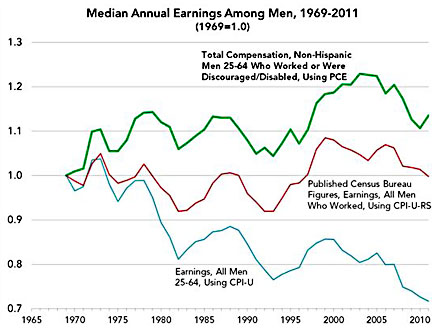What’s happened to the earnings of working-age men over the past four decades? A couple of years ago, Michael Greenstone and Adam Looney of the Hamilton Project crunched the numbers and concluded that they had fallen 28 percent between 1969 and 2009.
 Scott Winship has long been skeptical of this result, and today he published an essay explaining why. A lot of what he has to say is valuable: we should use the right measure of inflation, for example, and we should count total compensation, not just cash earnings. But regular readers will remember that I’ve never bought fully into Winship’s analysis. The problem is that every analytical choice he makes reduces the size of the apparent problem. Every one. It’s possible that this is just where the data takes him, but it leaves me wondering if he has his thumb on the scale. You’d think that if you took a comprehensive look at the data, you’d find stuff pointing in both directions.
Scott Winship has long been skeptical of this result, and today he published an essay explaining why. A lot of what he has to say is valuable: we should use the right measure of inflation, for example, and we should count total compensation, not just cash earnings. But regular readers will remember that I’ve never bought fully into Winship’s analysis. The problem is that every analytical choice he makes reduces the size of the apparent problem. Every one. It’s possible that this is just where the data takes him, but it leaves me wondering if he has his thumb on the scale. You’d think that if you took a comprehensive look at the data, you’d find stuff pointing in both directions.
But for now, I’m not here to argue with Winship. I just want to quote his final conclusion:
The adjustments yield the result that men’s compensation rose by 14 percent between 1969 and 2011. From 1969 to 2007, a peak year, the increase was 20 percent.
I think we can assume this is the most optimistic possible reading of the data. And yet what does it tell us? During a period when real GDP per capita increased 108 percent, men’s median total compensation has gone up only 20 percent. Even if Winship is right, it means that men’s income has been devastated over the past four decades. Given this, arguments over the technical merits of various measurement methods should be entirely secondary. No matter who’s right, the big questions we should be asking ourselves are how this happened, why it happened, and where all the money went. That’s what matters.


















